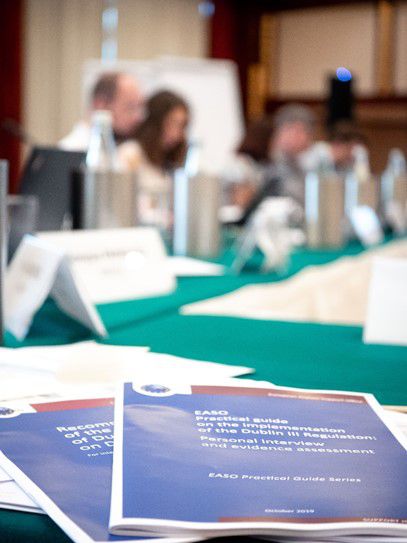The EUAA supports Member States in the implementation of the Dublin III regulation through its dedicated Network of Dublin Units. Through the Network, the EUAA facilitates the exchange of practices and cooperation between the Member States, and coordinates the development of specific operational standards, indicators, collection of good practices, guidance, network recommendations.
The EUAA supports Member States in applying the existing legal provisions in a more harmonised way.
The Dublin III regulation lays down the criteria to determine which Member State is responsible for examining an application for international protection. This is a Europe-wide procedure that is applied in all Member States in a similar way, following the criteria for the determination of responsibility. There are differences in national legislation and organisational set-ups of Member States, which is why diverse national practices exist when applying the regulation. The EUAA also cooperates with eu-LISA, Frontex and other agencies to make the use of Eurodac and other Dublin related technical systems more efficient for Member States, and to improve the quality and security of the information exchanged through these systems.

To achieve further harmonisation in the processes, facilitate cooperation and exchange between Dublin Units, the Network of Dublin Units was established in 2015. The Network consists of 30 members: EU countries plus Norway, Liechtenstein and Switzerland.
The Network of Dublin Units generates a diverse set of activities to exchange on practices, enhance cooperation and further harmonise the processes. These are done through the development of specific operational standards, indicators, collection of good practices, guidance and recommendations and exchange activities between peers.

- Guidance on Remote Interviews [EN]
- Practical Guide on Family Tracing
- Recommendations on Family Reunification within the Dublin Procedure [EN]
- Recommendations on Dublin transfers [EN]
- Practical guide on the implementation of the Dublin III Regulation: personal interview and evidence assessment [EN]
- Guidance on the Dublin procedure: operational standards and indicators [EN]
HTML version available here - Practical Guide on Information Provision in the Dublin Procedure [EN]
- Recommendations on Information Exchange between Dublin Units [EN]
- Recommendations on the Operational and Technical Use of DubliNet [EN]
The Dublin III regulation lays down several opportunities for family reunification. Under the Dublin procedure, unaccompanied minors or adults applying for international protection can be reunited with family members living elsewhere in Europe to have their applications for international protection examined in the same country. The activities organised by the EUAA on this topc aim for a swift, efficient, and successful family reunification procedure.
The Dublin III regulation ensures effective access to an asylum procedure in the EU+ and associated countries for those seeking protection. If a third-country national is to have their application examined in another Member State, they can travel there by way of a Dublin transfer. Such transfers need to take place within strict timeframes provided by the regulation. The EUAA supports the preparation, organisation and implementation of Dublin transfers to harmonise procedures, tackle inefficiencies, and streamline cooperation between Member States.
Dublin Units use a secure, encrypted electronic transmission channel called ‘DubliNet’ to exchange request, replies and messages according to the Dublin III regulation. The agency’s support regarding DubliNet aims to promote a harmonised use of the system. . The agency works closely with eu-LISA, the EU agency tasked with the operational management of DubliNet, and other technical systems.

High quality information provision to applicants for international protection is of key importance for an effective and efficient Dublin procedure. Applicants need to be well informed about their rights and obligations. To promote the harmonisation of the way the information is provided across the EU and associated countries, the agency will develop a ‘Pilot toolbox on provision of information to applicants for international protection in the context of the Dublin procedure’. The tool aims to support EU and associated countries in the implementation of information provision activities.
Furthermore, in 2021, the EUAA published a practical guide on the provision of information in and on the Dublin procedure, for use by Dublin practitioners and other asylum officials in the Member States.
Several types of events are organised by EUAA for the members of the EUAA Network of Dublin Units.

Head of the national Dublin Units or other designated representatives meet twice a year to set priorities for the network or endorsesany practical tools and/or conclusions or recommendations made by the Dublin expert groups.
The EUAA regularly organises thematic expert meetings to build the expertise and knowledge of national Dublin practitioners and offer a forum to discuss ways to effectively manage current challenges within the Dublin system.
Online events are organisedto share relevant information, raise awareness, and better understand how certain current issues are affecting the Dublin practice.
The Dublin Exchange Programme is organised for Dublin officers of the Member States. Participants can learn about projects, practices, and initiatives in other Member States, and see how policies, practices and initiatives work in another Member State.
The EUAA works to strengthen Dublin Units across EU+ and associated countries of operation by providing technical support to improve their Dublin processes and make them more efficient. The EUAA’s support on Dublin is related to, for example, the early identification of Dublin cases, technical support related to processing requests , and capacity building. Support to the Dublin Unit is currently provided in Greece, Italy, Cyprus ,Malta and Slovenia.
Information on procedural elements and rights of applicants subject to a Dublin transfer
The ‘Roadmap for improving the implementation of transfers under the Dublin III Regulation’ was endorsed in the meeting of the Strategic Committee on Immigration, Frontiers and Asylum (SCIFA) of the Council of the European Union on 29 November 2022. The roadmap identified a clear need for objective and neutral information on reception and detention conditions and the asylum procedure in all the Member States, which can serve as reference in transfer decisions and that can be used in national courts when the person concerned has exercised his or her right to an effective remedy.
This data collection is based on Article 5 of the regulation on the European Union Agency for Asylum (EUAA). Member States were requested to provide information that reflects both the relevant legal provisions and the practical implementation of these provisions. The scope of the fact sheets are limited to rules and conditions applicable to applicants for international protection as well as other persons that are subject to a transfer under the Dublin III regulation.
The European Commission and the EUAA jointly developed the template which served as the basis for these fact sheets. The EUAA gathers and stores the fact sheets and requests Member States to update the information at least one time per year. The relevant national authorities of the Member States provide all the information contained within the fact sheets and are responsible for ensuring that it is accurate and up-to-date.
| Contry |
Factsheet
|
|---|---|
|
Austria |
|
|
Belgium |
Download |
|
Bulgaria |
Download |
|
Croatia |
Download |
|
Cyprus |
Download |
|
Czechia |
Download |
|
Denmark |
Download |
|
Estonia |
Download |
|
Finland |
Download |
|
France |
Download |
|
Germany |
Download |
|
Greece |
Download |
|
Hungary |
Download |
|
Iceland |
Download |
|
Italy |
Download |
|
Latvia |
Download |
|
Liechtenstein |
Download |
|
Lithuania |
Download |
|
Luxembourg |
Download |
|
Malta |
Download |
|
The Netherlands |
Download |
|
Norway |
Download |
|
Poland |
Download |
|
Portugal |
Download |
|
Romania |
Download |
|
Slovakia |
Download |
|
Slovenia |
Download |
|
Spain |
Download |
|
Sweden |
Download |
|
Switzerland |
Download |

